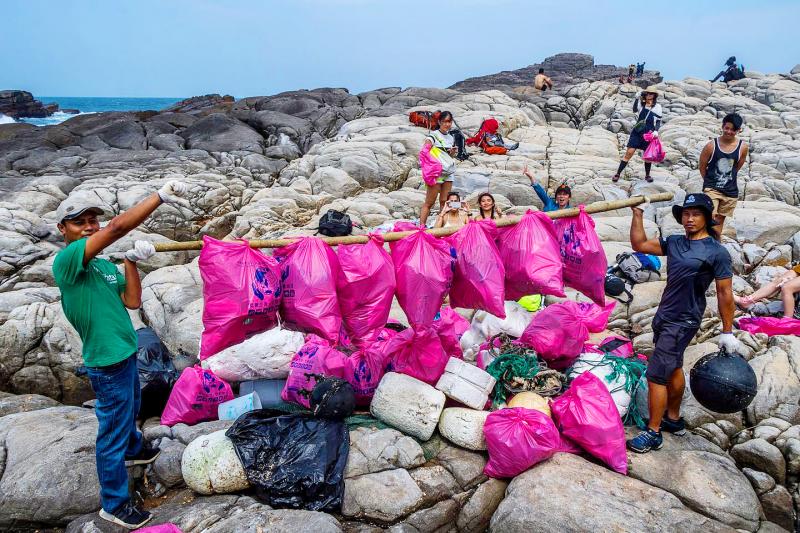In the opening months of this year, as coronavirus wreaked havoc on the global economy, environmentalists noticed an unexpected benefit of the pandemic. Amid national lockdowns and a sharp fall in demand for international travel, air pollution levels went into an unprecedented decline.
However, a World Economic Forum report published last month indicated that coronavirus’s effect on the environment has not been entirely positive. The report warned that an increase in demand for single-use plastics required for medical supplies, alongside reduced monitoring of waste disposal, “will have long-term impacts on the environment.”
Despite success in controlling the spread of coronavirus, Taiwan is not exempt from these emerging environmental challenges. It is against this background that volunteers will take to Taiwan’s beaches and forests tomorrow for the Taiwan National Clean Up Day.

Photo courtesy of Taiwan National Clean Up
This will be the fourth year of the nationwide event, which has now expanded to 22 locations including Penghu (澎湖) and Miaoli (苗栗) counties and Taitung County’s Dulan Village (都蘭). An expected 1,000 volunteers will take part collecting close to 10 tons of garbage.
Ryan Hevern, the American co-founder of the event, underscored the importance of this year’s clean-up and urged against equating the dip in tourism due to coronavirus, with a fall in the volume of garbage they expect to collect.
While admitting the organization anticipated finding less sky lanterns littering the forests near tourist hot-spots Shifen (十分) and Pingxi (平溪), Hevern emphasized that coronavirus would have “no effect whatsoever” on the amount of garbage they would find on Taiwan’s beaches.
A crucial reason behind this is the garbage’s wide range of sources, of which the local fishing industry is a major contributor. Beyond the expected plastic containers, previous volunteers combing the beaches have found rope, netting and even refrigerators.
Another key dimension is that a significant proportion of the garbage is international in origin. Plastic bottles brought by ocean currents to Taiwan’s beaches often come from places as far away as China, Vietnam and Indonesia.
For Philip Chang (張上緒), a volunteer who has joined every year, it is finding garbage like this that re-affirms the importance of the event. This year, he will help clean up Jinshan Beach (金山).
Chang says that when you begin finding garbage from other countries, you “realize the global nature of this problem.” In turn, this has an impact on the Taiwanese participants themselves, in cultivating a sense of “global citizenship.”
As the world transitions out of the coronavirus crisis, projects like National Clean Up Day will only increase in importance. They will be vital in drawing attention to and redressing the increased volume of plastic waste caused by the pandemic.
For Chang, raising awareness within communities is the crucial first step. Because once the problem is recognized, he continues, “you feel a sense of accountability toward solving it.”
For more details, go to Facebook page: Taiwan National Clean Up Day.

Oct. 27 to Nov. 2 Over a breakfast of soymilk and fried dough costing less than NT$400, seven officials and engineers agreed on a NT$400 million plan — unaware that it would mark the beginning of Taiwan’s semiconductor empire. It was a cold February morning in 1974. Gathered at the unassuming shop were Economics minister Sun Yun-hsuan (孫運璿), director-general of Transportation and Communications Kao Yu-shu (高玉樹), Industrial Technology Research Institute (ITRI) president Wang Chao-chen (王兆振), Telecommunications Laboratories director Kang Pao-huang (康寶煌), Executive Yuan secretary-general Fei Hua (費驊), director-general of Telecommunications Fang Hsien-chi (方賢齊) and Radio Corporation of America (RCA) Laboratories director Pan
The consensus on the Chinese Nationalist Party (KMT) chair race is that Cheng Li-wun (鄭麗文) ran a populist, ideological back-to-basics campaign and soundly defeated former Taipei mayor Hau Lung-bin (郝龍斌), the candidate backed by the big institutional players. Cheng tapped into a wave of popular enthusiasm within the KMT, while the institutional players’ get-out-the-vote abilities fell flat, suggesting their power has weakened significantly. Yet, a closer look at the race paints a more complicated picture, raising questions about some analysts’ conclusions, including my own. TURNOUT Here is a surprising statistic: Turnout was 130,678, or 39.46 percent of the 331,145 eligible party

The classic warmth of a good old-fashioned izakaya beckons you in, all cozy nooks and dark wood finishes, as tables order a third round and waiters sling tapas-sized bites and assorted — sometimes unidentifiable — skewered meats. But there’s a romantic hush about this Ximending (西門町) hotspot, with cocktails savored, plating elegant and never rushed and daters and diners lit by candlelight and chandelier. Each chair is mismatched and the assorted tables appear to be the fanciest picks from a nearby flea market. A naked sewing mannequin stands in a dimly lit corner, adorned with antique mirrors and draped foliage

The older you get, and the more obsessed with your health, the more it feels as if life comes down to numbers: how many more years you can expect; your lean body mass; your percentage of visceral fat; how dense your bones are; how many kilos you can squat; how long you can deadhang; how often you still do it; your levels of LDL and HDL cholesterol; your resting heart rate; your overnight blood oxygen level; how quickly you can run; how many steps you do in a day; how many hours you sleep; how fast you are shrinking; how